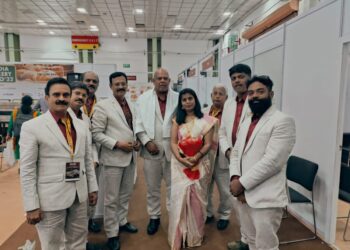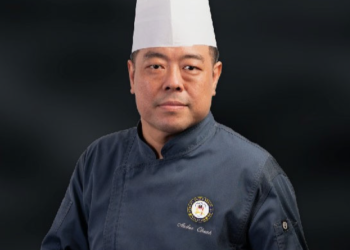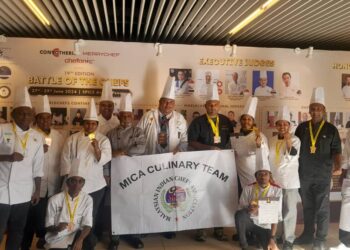By Chokkapan S (chock@imaws.org)
A famous premium vegetarian restaurant chain across Tamil Nadu, especially familiar to Chennaiites, is hardly doing 10-20 percent of its regular business over the last year. Tough to believe? Ask its owner, and he laments at the drop of a hat, “Our business situation has been dire since last March. In fact, we are almost incurring losses since last March. It’s extremely difficult to retain our manpower and there is no support from banks or the government.”
It’s ‘Namma Veedu’ Vasanta Bhavan, which has been in the food business for nearly the last five decades. The restaurant was launched in a small set-up in Tiruchirappalli way back in 1969 before its founder A. Muthukrishnan expanded with a second outlet in Chennai in 1974. It has over 16 franchises across Tamil Nadu today and used to serve over 30,000 customers across its outlets daily, until last March.
The man of the moment, in question, is Vasanta Bhavan’s Executive Chairman, Ravi Muthukrishnan, the second generation entrepreneur from the foodie family. “Usually, we have 50 people on the payroll. But since only parcels are permitted (since the lockdown), there is only a need for 10 persons. Most of our local employees have left for their native places, set to return after things get normal. The migrant workforce, the majority whom we depend on, is staying in rooms. Since they don’t have work, I fear they could contract Corona if they roam outside,” says Mr Ravi.

He points out that food and hospitality is the only sector that employs both skilled and unskilled workers. “We provide employment to around 40-50 lakh people, but the government readily provides tax sops and subsidies, including cheap electricity and free land, for up to 10 years to foreign entrants. They hardly employ 2,000-3,000 employees each. Why don’t you encourage Indian restaurants?” asks Mr. Ravi, who also serves as the president of the Chennai Hotel Association.
Elaborating on how the local food industry employs people quickly just on reference, he poses a pointed question to the government: ‘why do you tax us when we use and promote agricultural produce?’ “Aren’t we just repurposing the products from our agricultural and dairy farms, and selling them? Why should a patron shell out 5 percent tax thrice every day? We are being levied so many – nearly 20 – different types of license fees as well. Furthermore, 18 percent taxation on rent is really exorbitant.”
Against this grim backdrop, Mr. Ravi says that it would be difficult for all types of restaurants to survive the Covid-19 onslaught. “Large outlets, too, will die down soon (if the current situation continues). For instance, our Tambar am outlet is a fine-dining restaurant that can accommodate around 500 customers, spread over 2 Thousand square feet of carpet area. We used to have over 3 Thousand unique customers in a day. But it’s not the same anymore. Over 50 percent of customers today prefer the online order option, as it helps them save time and lets them eat any meal at home. They are not keen on spending time with others by visiting a restaurant.”
As for the evolving eating habits of Indians, he says that many prefer international cuisines nowadays. “Gone are the days when most from my age group used to prefer Indian foods. They also prefer two international meals a day and just one course of Indian food. Most people think that all the frozen and preserved international foods are good for their health.” Only if a restaurateur opens 10-15 outlets can they expect decent returns, with decent sales and income. If it is less than that input costs will be quite high, also considering the transportation costs, etc., opines Mr. Ravi.
This would be the case with the travel and tourism industry as well, feels Mr. Ravi. “I would say that international flights will be cut down to just 25 percent in another three years. People would travel only on business trips and not on vacations or for leisure from now on,” he adds.

Mr Ravi has a piece of advice to budding entrepreneurs in the food & beverages sector: “All businesses need the right timing. The success rate of a single-dish restaurant is quite high, but it doesn’t work the same way with all kinds of food outlets. Also, one has to get trained professionally and learn the tricks of the trade, which is not always possible from one’s mother or aunt. Most new entrants miscalculate the profits in this business to be over 50 percent. But once the cuisines or menu gets diverse, it gets extremely difficult to control overheads and manage the business profitably.”
That aside, he is full of praise for the effort of the personnel from the North-East. “Only they – almost 65 percent of the entire industry’s workforce – save our industry, as hardly 20 percent of hotel and restaurant staff are from Tamil Nadu and the rest from other parts of south India. The N-E workers are hard workers without any demand for fixed work hours. They are also so involved in any task and learn quickly. In the future, they will form 90 percent of the industry’s headcount,” Mr Ravi declares even as he wraps up the convivial conversation.
ADVT: Best wishes to Vasantha Bhavan. ‘Malligha’ compounded Asafoetida, From the house of M.A.C (www.asafoetida.in).For details and free samples in the HoReCa segment, contact: +91 9943441147







